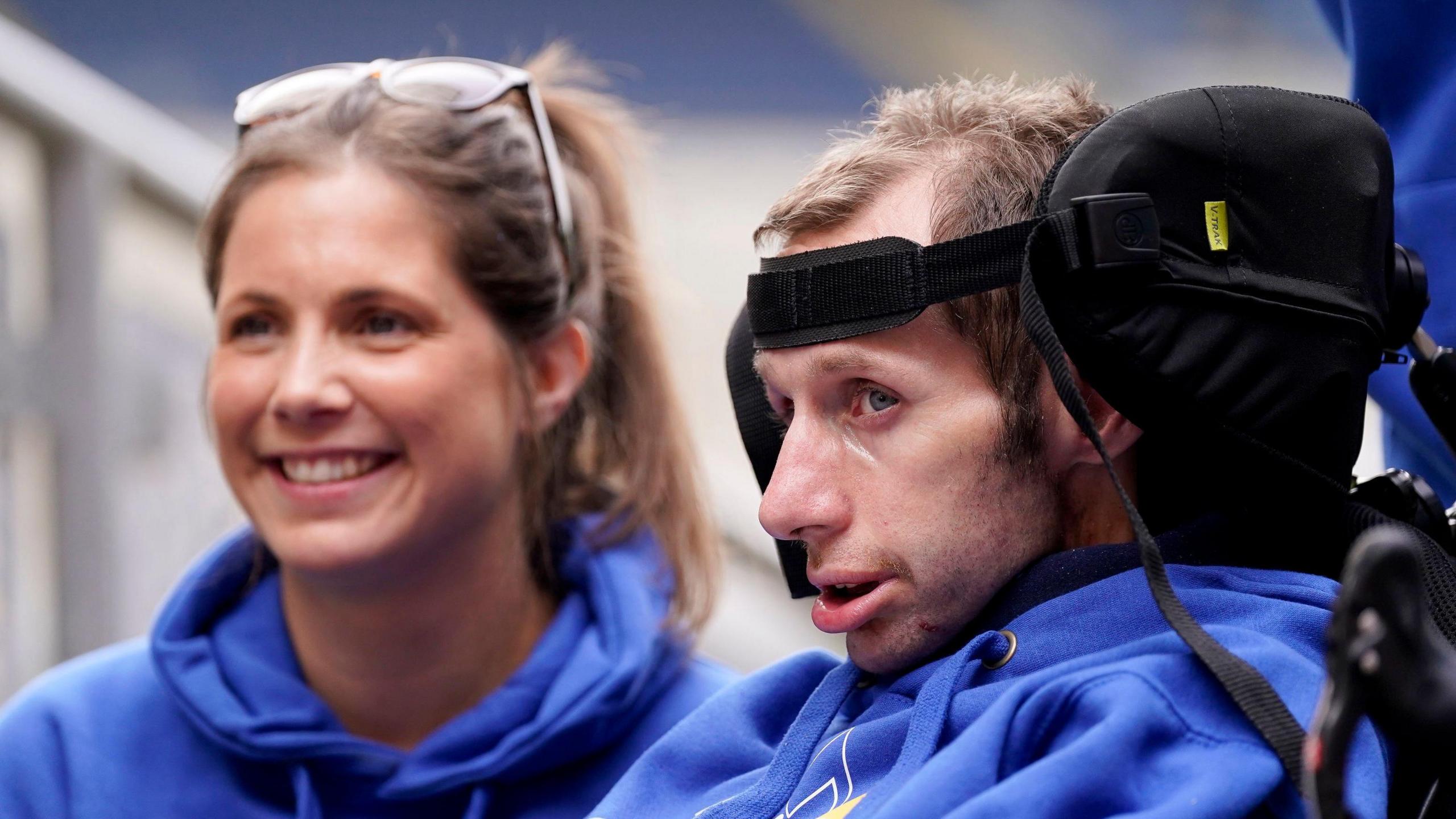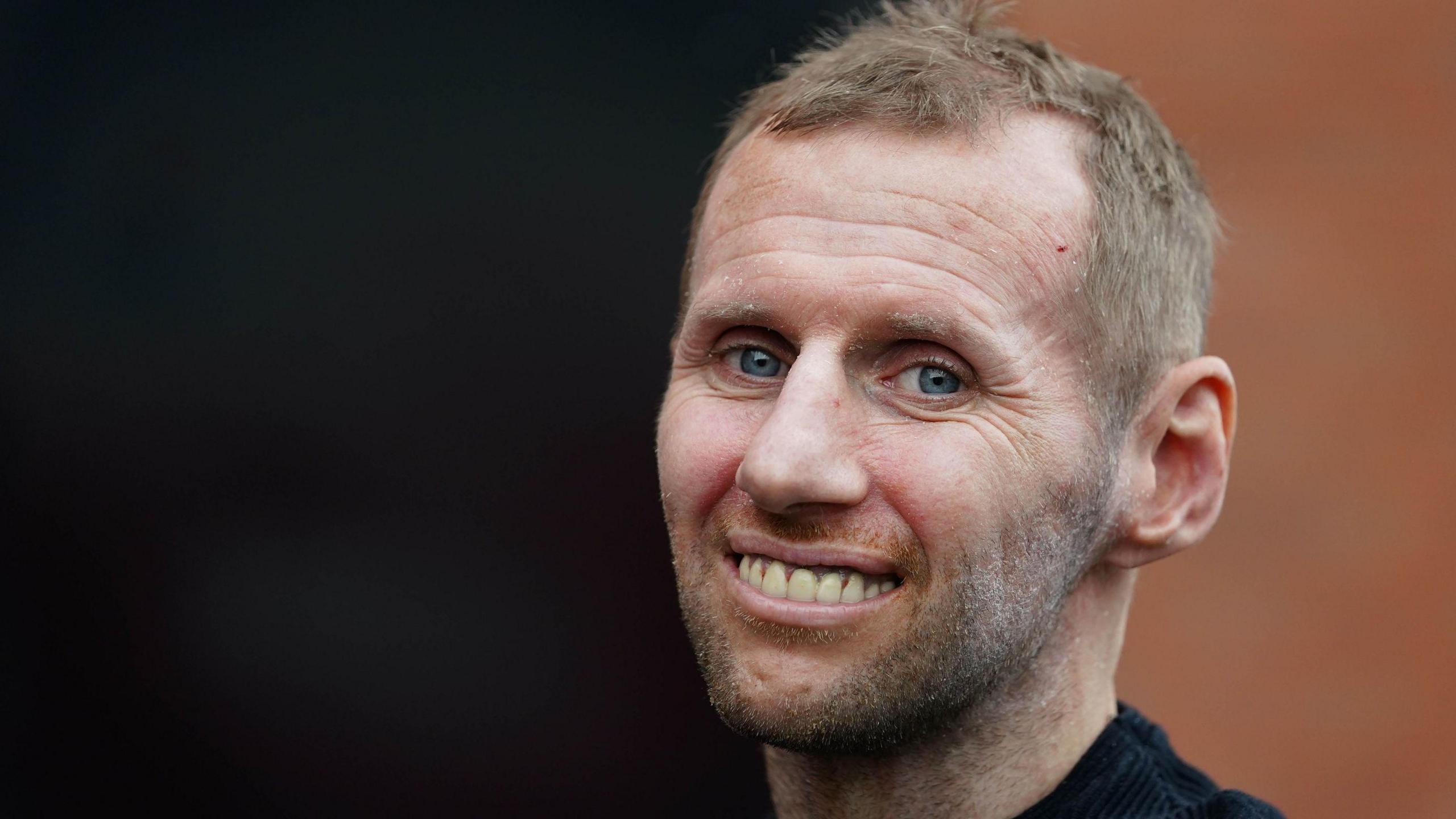Is there a cure or treatment for MND?

Rob Burrow campaigned for greater awareness of MND with his wife Lindsey
- Published
Tributes have been paid to former rugby league player Rob Burrow, who has died from motor neurone disease (MND) at the age of 41.
His death, four years after his diagnosis, has prompted lots of questions about this devastating disease and the search for a cure.
What is MND?
MND affects nerves found in the brain and spinal cord, which tell your muscles what to do. This leads them to weaken and stiffen over time and usually affects how you walk, talk, eat and breathe.
Progression of the disease can be rapid - more than half of those affected die within two years of being diagnosed.
How do you get MND?
It is a relatively rare condition which is most common in people over 50, but adults of any age can be affected.
A person's lifetime risk of developing MND is one in 300.
About 5,000 adults in the UK will have the disease at any one time.
Scientists are not sure what causes MND, but it is likely to be a combination of the genes - or biological traits - you get from your parents when you are born, and other lifestyle factors.
For up to one in 10 people with MND, specific genes play a much larger role. There is usually a family history of the disease in these cases.
What are the first signs of the disease?
MND affects everyone differently.
Not everyone has the same symptoms, or experiences them in the same order.
The disease can progress at different speeds too.
Some of the most common signs are:
muscle weakness and cramps
stiff joints
problems with how you speak
issues with swallowing, eating and drinking
weakened coughing
Is there a cure?

Rob Burrow was diagnosed more than four years ago
There is no cure, but there is hope coming from treatments targeted at different forms of MND.
MND is not one disease, it is really several that all culminate in the death of motor neurones or nerve cells.
A new drug called tofersen works in only one-in-50 patients, however it has been shown to slow, and in some cases even reverse, some of the symptoms of MND.
It has been described as "truly remarkable" and a "real moment of hope" for the whole disease.
Although the drug has recently been approved in the European Union, it is not yet available in the UK.
What drug treatments are available in the UK?
There is only one drug currently licensed for the treatment of MND in the UK and approved by the NHS.
Riluzole may slow down the progression of the disease and increase survival by several months, but it does not reverse damage.
It is available as a tablet, liquid and as a film that dissolves on the tongue.
Promising early results of a trial of an immunotherapy drug interleukin-2 were published in December 2022.
It showed a 40% decrease in the risk of death at 21 months for a large subgroup of MND patients taking part.
There has been some disquiet in the MND community about how long it is taking to release the full results, but researchers are hopeful these will be submitted by the end of July to a peer-reviewed journal.
What is the link between exercise and MND?
Elite athletes are disproportionately affected by motor neurone disease.
Studies in Italian footballers have suggested rates up to six times higher than the general population.
In 2021, scientists at the University of Sheffield performed a series of genetic tests and showed “conclusively” that exercise was increasing risk.
They showed people had to be born more susceptible to the disease and then a lifetime of strenuous exercise had the potential to trigger MND.
It is thought low levels of oxygen in the body during intense exercise stresses the motor neurones - which are some of the biggest and most oxygen-demanding cells in the body – causing damage.
The researchers hope their work will eventually lead to a way of tailoring advice, similar to screening professional footballers for heart problems.
What is life expectancy for MND?
Some people can live for many, many years with MND, for example, theoretical physicist Stephen Hawking who was diagnosed at the age of 22 and lived to 76.
But for most, the disease progresses quickly and life expectancy is just a few years.
According to the charity MND Association, the disease kills a third of people within a year and more than half within two years of diagnosis.
As the nerve cells stop working, swallowing and breathing become more challenging and many people need feeding tubes or breathing apparatus to help them stay alive.